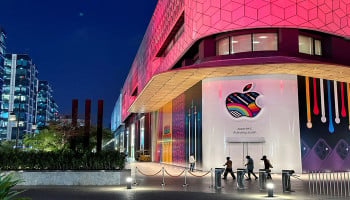
Shark Tank Pakistan — a reality show where aspiring entrepreneurs will pitch their business ideas to a panel of investors dubbed "sharks" — is all set to debut in the country beset by economic downturn and brain drain.
Since its inception in 2009 on ABC, the business-oriented reality show has been a glamorous platform for those with well-crafted business models that possess the potential to turn a roadside food stall into a globally recognised food chain.
The concept of entrepreneurship is relatively new in South Asia, but its impact in the region has gone beyond merely attracting millions. It has opened doors for innovative ideas lacking the financial support to stand out and achieve success.
As the shows' inaugural ceremony nears, experts and economic wizards, discounting the intellectually potent ordinary netizens, are casting the gloomy shadow of the sinking economy on it, anticipating a tough time for the yet-to-win entrepreneurs in the backdrop of Pakistan’s unwelcoming ecosystem for businesses.
The rights to launch Shark Tank Pakistan in the country have been acquired by Grenlit Studios, which aims to redefine Pakistan’s brand image through an adaptation of a globally recognised business reality TV show.
Who are the judges?
Shark Tank Pakistan is setting the stage for seven sharks, namely Faisal Aftab, a technology and venture investment expert; Rabeel Warraich, a veteran in tech innovation; Aleena Nadeem, a fintech trailblazer with a focus on education; Romanna Dada, an experienced investor and entrepreneur; former Careem MD Junaid Iqbal; IGLOO MD Karim Teli; and Usman Bashir, an expert in retail and gas stations.
Despite the well-settled gloom hovering for decades over the country’s economy, the reality show is expected to significantly benefit the country's startup ecosystem, broadcasting a blend of entertainment with crucial exposure and investment opportunities to propel deserving entrepreneurs into the limelight, said Grenlit Studios’ co-founder and CEO Usman Malik told Gadinsider, in an exclusive chat.
The programme is an imitation of a bandwagon which witnessed tremendous success in India. Usman Malik shared in an interview with an international media outlet that the inspiration for the show stemmed from Shark Tank India’s popularity and its potential to stimulate job creation through new businesses.
He was of the view that while large-scale startups are faced with massive capital costs, micro and small-to-medium-scale startups are imperative for employment and economic growth, which he believes the initiative will give rise to.
Shark Tank Pakistan vs saturated business sector
"Great entrepreneurs always have the ability to foresee and navigate challenges, which makes them successful entrepreneurs. Facing competition and surviving in their respective business verticals trickles down to whoever provides the better product/service, and the market will choose who stays,” Malik said when asked how entrepreneurs with successful business models will withstand intense competition and the economic crisis Pakistan is currently facing.
“All economies across the globe go through ‘sine curve’ business cycles but Pakistan unfortunately has always been marketed as a challenging economy. There is hope if we can repurpose financial, human and intellectual capital towards creating true value instead of being a rent-seeking economy,” added the Grenlit CEO.
He also gave some remarks that shone a light of validation on the exodus of investments and businesses from Pakistan, as he admitted that raising venture capital (VC) being a Pakistani startup is very challenging.
“Access to the VC ecosystem is very difficult for a startup that does not have access to the elite VC circles. Shark Tank Pakistan is a step to democratise access to VC and help deploy capital to small-and-medium-scale enterprises (SMEs) from all segments and not just tech,” Malik noted.
Number of startups and allocated funding
Gadinsider also learned that around 100 business ideas will be given the privilege of presenting their business model on stage. Pitches from applicants will be entertained from a diversity of sectors.
Regarding the provision of funding to successful startups, Malik noted that the amount allocated for potential businesses “are not VC scale,” while adding that investment amounts are entirely determined by the investors.
This means that the programme would grant sharks full authority over deciding how much capital should be allocated to each startup, however; it will rely solely on their evaluation of the startup’s potential.
With the free hand being given to investors, there appears to be a probability of disproportionate extension of funding, considering varying backgrounds, expertise and wealth sharks are bringing to the table.
Whatever the case, this flexibility of the disbursement of capital allows the judges to bring their investments on par with how big of a risk is fathomable to them, their financial strategy, and confidence in the entrepreneur's vision.
















